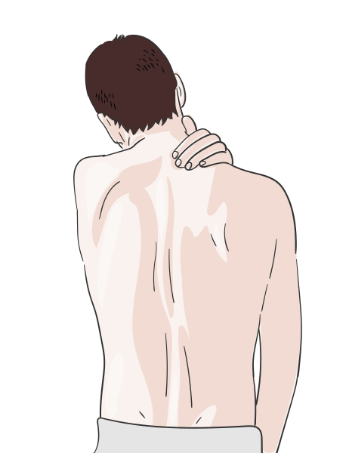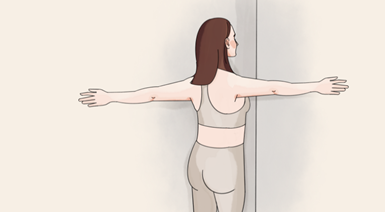Neck pain
General painful complaints in the neck, throat and shoulder area are often summarized under the term “neck pain”.

On this subject:
How does neck pain develop?
In most cases, neck complaints arise from tension in the muscles of the front and back of the neck. The problem is already inherent in our anatomy: compared to the rest of the spine, wide rotations and movements are possible due to the special mobility of the cervical spine. This great flexibility is made possible by a multitude of nerves and muscles and seven cervical vertebrae. In addition, if the head is tilted forwards or to the side, it transfers many times its weight to the cervical spine and thus overwhelms it in the long run. As a result, muscle stiffness can affect the mobility of the cervical spine.
Another factor is our lifestyle: Most people do not move enough or move incorrectly and sit too much while at work, at home on the sofa or in the car. For this reason, neck pain and shoulder pain are relatively widespread among the population, especially among adults. But even children and adolescents are increasingly complaining of tension in the neck area.
Often, neck complaints and pain in the shoulder occur in an isolated and attenuated form, for example as slight tension.
Infact, painful neck muscles become noticeable after long periods of sitting in the car or at work. You are concentrated, maybe even stressed, and don’t even notice how the inner tension is transferred through your body. Muscles get stiff, And The result is neck pain. A vicious circle of cramped and tense muscles, overstimulated nerves and pain, which in turn leads to more tension, begins.
How does neck pain start?
Symptoms such as limited mobility, stabbing or probing pain, or even just a pulling sensation in the neck accompanied by headaches, are the most common signs of neck pain. Symptoms that occur individually, such as a stiff neck caused by drafts, are generally uncomfortable, but not cause for alarm. However, other symptoms such as tension headaches, muscular tinnitus or recurring dizziness can also limit the quality of life in the long term. We should be aware that even occasional neck pain is a warning signal. Acute pain can turn into chronic pain on neck and shoulders, which can lead to secondary conditions if we ignore the initial neck and shoulder problems.
We should by no means ignore these symptoms: If neck pain and stiffness accompany fever, cramps, severe headache, paralysis, nausea, sensitivity to light, drowsiness or loss of consciousness, an emergency doctor should be contacted immediately. This could be a life-threatening condition such as meningitis, a heart attack or a brain hemorrhage.
Is my neck pain acute or chronic?
We talk about acute neck pain when the complaints do not last longer than two weeks. Subacute neck pain can drag on for four weeks. If the symptoms last longer than six weeks, they are considered chronic neck pain. Pain in the neck and shoulders that flares up again and again after longer breaks (freedom from pain of at least one month) is called recurrent (relapsing) pain.
While acute neck pain is harmless in most cases, chronic neck pain can indicate physical signs of wear and tear that can result in secondary symptoms such as migraine, slipped discs, inflammation in the shoulder joints and breathing issues.
What symptoms are related to neck pain?
On one hand, neck pain can be a symptom of another condition. On the other hand, it can also occur as a separate clinical picture with the following symptoms:
· Pulling or probing pain in the neck
· Radiance up to the head and jaw, shoulders, and arms
· Tension headache
· Pressure pain in certain places
· Muscle hardening
· Inability to move up to a stiff neck
· Stiffness after getting up
· Relief and poor posture up to torticollis
· Dizziness and ringing in the ears/tinnitus
· Tingling and numbness in arms and fingers
· Impaired vision
· Muscle weakness

What are the causes of neck pain?
Neck pain can have a variety of causes and triggers.
- Physical causes
-
The most common physical causes of neck pain include:
· Muscular tension and cramps
· Draughts
· Strains
· Bad posture
· Whiplash
· Flu-like infections
· Unfavorable sleeping position, wrong mattress or wrong pillow
· Physical overload and incorrect loading
· Weak neck muscles
· Signs of wear and tear (degenerative changes such as arthrosis and osteoporosis)
· Transmission pain (diseases of other organs that transmit pain to the neck area via the nerve pathways in the spine). - Psychological factors
-
The psychological factors and triggers for neck pain include:
· Stress
· Fear
· Sleep disorders
· Depression - More serious causes and triggers
-
More serious causes and triggers of neck pain can be:
· Herniated discs, spondylosis and chondrosis (degenerative changes in the spine, cartilage and intervertebral discs)
· Infections of the intervertebral discs, vertebrae, neck and jaw area
· Rheumatic diseases (rheumatoid arthritis and ankylosing spondylitis)
· Fibromyalgia syndrome (chronic pain disorder)
· Scoliosis and Scheuermann’s disease (deformities of the spine)
· Cervical spinal stenosis (narrowing of the spinal canal)
· Rickets (bone growth disorder)
· Abscesses
· Tumors or metastases in the neck region and on the thyroid glandIf these conditions are suspected, medical advice should be sought quickly.
- Very serious causes and triggers
-
Very serious causes and triggers of neck pain that need immediate emergency medical attention include:
· Injuries to the cervical spine and vertebral fractures
· Meningitis
· Cerebral hemorrhage
· Heart attack
· Acute aortic syndrome (disease of the aorta)

Caution: If neck pain suddenly appears together with fever, cramps, severe headache, paralysis, nausea, sensitivity to light, drowsiness, loss of consciousness or stiff neck, it may be a medical emergency! In these cases, call the emergency doctor immediately.
Who can diagnose neck pain?
If neck complaints flare up repeatedly or are even chronic, medical advice should definitely be sought. First of all, the family doctor’s practice can give an initial assessment of the complaints and, if necessary, arrange for a referral to other specialists. Specialized in diseases of the spine and musculoskeletal system, orthopedicc doctors can diagnose a possible physical cause for neck complaints, also with the help of imaging procedures such as X-rays, computer tomography (CT) or magnetic resonance imaging (MRI). It should be clarified whether the complaints in the neck or shoulder area are triggered by an isolated cause - or whether they occur as a concomitant of another illness or after an accident. If typical physical factors such as muscle tension or changes in the skeleton can be ruled out for neck pain, possible neurological or organ-related causes should be clarified. This also applies to neck pain accompanied by numbness and tingling in the arms or other neurological complaints. Neurologists and internists are the right people to talk to about this.
Often, neck pain is also triggered or exacerbated by psychological factors such as stress, fear, excessive demands, lack of sleep or depression. Because when a person is under pressure or suffering, this also has the effect of a tense posture, in which the front and back muscles of the neck are often tense and the shoulders are pulled up. If psychological factors are suspected, psychiatrists, psychologists and psychotherapists can help.
Other experts who can identify the cause and triggers of neck pain and treat it professionally include physiotherapists (e.g., osteopaths and chiropractors), acupuncturists and masseurs.
-

THERMACARE® For neck and shoulder and wrist
for the treatment of neck, shoulder and wrist pain
FREQUENTLY ASKED QUESTIONS
- What helps quickly with neck pain?
-
In the case of painful tension in the neck and shoulder region, depending on the cause, therapeutic heat, for example ThermaCare® HeatWraps for the neck and shoulders, conventional pain relievers and exercise can help. If neck pain persists or worsens, medical advice should be sought to determine the cause.
- Which doctor helps with neck pain?
-
The first professional to contact is your family doctor. Depending on the characteristics of the pain and the specific individual circumstances the family doctor can refer you to a neurologist, If you have neck pain accompanied by numbness and tingling in the arms or other neurological complaints, to an internist, if there are organ-related causes.or to psychiatrists, psychologists and psychotherapists if psychological factors are suspected .
Other experts who can identify the cause and triggers of neck pain and treat it professionally include physiotherapists (e.g. osteopaths and chiropractors). In case of severe, acute neck pain accompanied by fever, cramps, severe headache or pain in other parts of the body, paralysis or impaired consciousness, you should call an emergency doctor immediately. - When to see a doctor with neck pain?
-
Please seek medical advice for
- Complaints that do not improve within 3 weeks
- recurring pain
- chronic pain
- severe pain
- numbness or tingling in your arms
- dizziness or blurred vision
- muscle weakness
- severe restriction of movementPlease call the emergency doctor immediately in the case of
- Neck pain accompanied by fever, cramps, severe headache, paralysis, nausea, sensitivity to light, drowsiness, loss of consciousness or stiffness of the neck.
- Injuries to the cervical spine and/or head - How should you sleep with neck pain?
-
The best sleeping position for neck pain is on your preferred side, with your leg flexed and a pillow between them. The choice of the pillow under your head should be led by the comfort you feel using it.
- When is neck pain dangerous?
-
Neck pain accompanied by fever, cramps, severe headache, paralysis, nausea, sensitivity to light or impaired consciousness may indicate acute meningitis. A heart attack or brain hemorrhage can also be accompanied by neck pain. In these cases, as well as in the case of acute injuries to the cervical spine, an emergency doctor must be called immediately.
- Which painkiller helps with neck pain?
-
Conventional pain relievers such as ibuprofen or paracetamol help with neck pain. A natural pain-relieving effect without drug-typical side effects is offered by drug-free heat applications, such as the ThermaCare® HeatWraps for neck and shoulder.
- How long does neck pain last?
-
Acute neck pain usually lasts about 1 to 2 weeks. If neck pain persists for more than 3 months, it is called chronic neck pain. If neck pain keeps flaring up after pain-free breaks, this is considered as recurrent (recurring) neck pain.
- Why does neck pain occur with a cold?
-
Neck pain caused by a flu-like infection or influenza is usually muscular: The body tenses more. Neck, head and limb pain can also be triggered directly by the immune system’s defense cells and usually disappear again after the infection. Prolonged bed rest also increases neck tension for some patients.



